Tea is something I drink every single day. It’s sacred at my house – I even have a whole drawer devoted to it! I drink it because it is amazing for your health. There are so many varieties of tea that can improve digestion, metabolism and even prevent certain diseases. This investigation into tea ingredients has been in the making for a long time. What I’m about to share with you totally rocked my world forever and I’ll never look at tea in the same way again. Do you really want to know what’s in your tea?…Then read on.
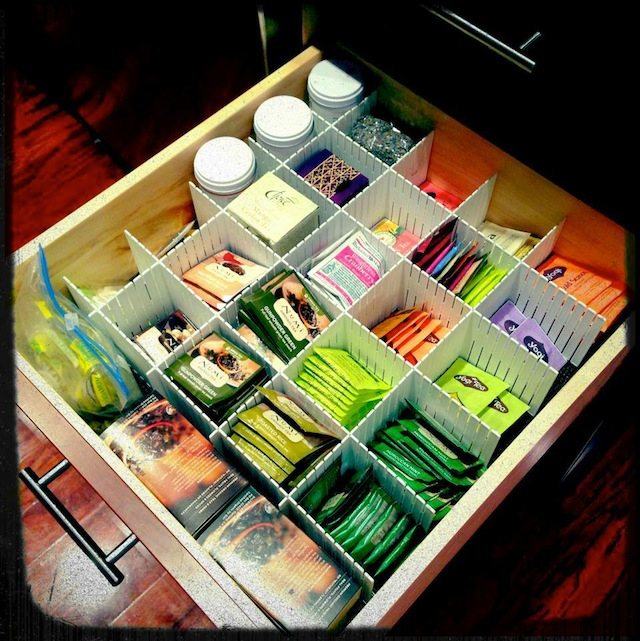 The ancient Chinese tradition of drinking tea dates back thousand of years to the early Chinese dynasties and aristocrats who drank the beverage for its medicinal properties. In ancient times, leaves from the Camellia Sinensis (the tea plant) were either ground into a powder or placed as loose leaves directly into water to infuse it with herbal essence. Unfortunately, modern day tea is nothing like the unadulterated version of old tea. Many of today’s tea brands are operating under the guise of providing health benefits and promoting clean living, but are actually laden with pesticides, toxins, artificial ingredients, added flavors and GMOs.
The ancient Chinese tradition of drinking tea dates back thousand of years to the early Chinese dynasties and aristocrats who drank the beverage for its medicinal properties. In ancient times, leaves from the Camellia Sinensis (the tea plant) were either ground into a powder or placed as loose leaves directly into water to infuse it with herbal essence. Unfortunately, modern day tea is nothing like the unadulterated version of old tea. Many of today’s tea brands are operating under the guise of providing health benefits and promoting clean living, but are actually laden with pesticides, toxins, artificial ingredients, added flavors and GMOs.
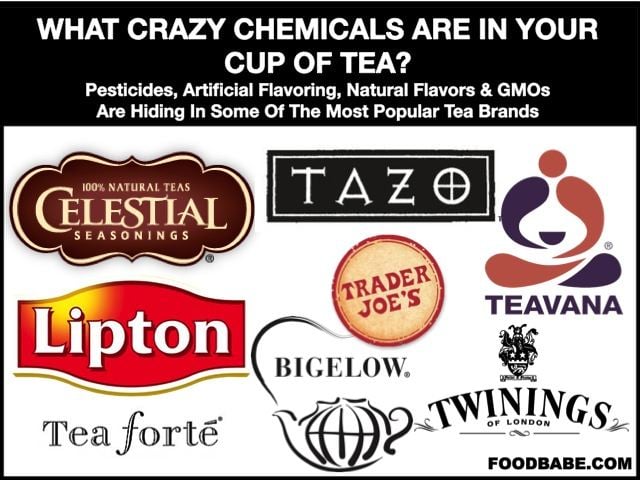
Conventional Teas – An Abundance of Pesticides
Did you know that most tea is not washed before it is put it into bags? That means if the tea was sprayed with cancer-causing pesticides, those pesticides go directly into your cup. And this is the reason why tea is on my organic shopping priority list. To prove this point, here are some shocking facts about one of the most well-known tea brands – Celestial Seasonings.
A recent third-party analysis by Glaucus Research and discussed here found that 91 percent of Celestial Seasonings tea tested had pesticide residues exceeding the U.S. limits. For example, Sleepytime Kids Goodnight Grape Herbal contained 0.26 ppm of propachlor, which is a known carcinogen under California’s Propsition 65.
The “Wellness” tea line was found to contain traces of propargite, also a known carcinogen and developmental toxin. The FDA has already issued two warning letters to Celestial Seasonings in regard to poor quality control according to this source. Imagine what happens when pesticide-laden tea is steeped in boiling water.
If grocery store brands don’t provide a clean option for you, perhaps a high-end loose leaf tea would circumvent some of the issues of grocery store brands. Right? Wrong! Take Teavana, which is found in malls across North America for example. Teavana taps into tea culture with the “Teavana Experience.” Convincing their employees to take customers on a sensory journey – they open a huge canister of loose leaf tea and wave the top of the canister so you can smell the tea – touting all of the wonderful health benefits of tea complete with samples and manipulative demonstrations that end in an expensive visit to the tea shop. Is all the extra money worth it? Are customers getting a superior tea product? No.
Teavana tea was tested by an independent lab and 100 percent of it was found to contain pesticides. One tea in particular, Monkey Picked Oolong, contained 23 pesticides. 77 percent of the teas would fail European Union pesticide import standards, and would be banned from import. 62 percent of the teas tested contained traces of endosulfan, a pesticide that has been banned by the U.S., China, the E.U., and 144 other countries because it has been linked to impaired fertility and could harm unborn babies.
UPDATE (May 27, 2014): Glaucus Research funded the research done by Eurofins Scientific (an independent lab) and admits on their disclaimer that they are biased because they would make money if Hain’s stock declines. However – I am not sure that Eurofins’ research should be completely discounted on this point alone. Since I wrote this post, Celestial has been sued in a class-action lawsuit based on the pesticides that Eurofins found in their teas and for mislabeling of them as “100% Natural”. The jury is still out on whether Eurofins’ research will be considered legit, as this case is still active in California. The Plaintiffs contend that Celestial’s teas contain “pesticides, herbicides, insecticides, carcinogens, and/or developmental toxins (collectively, “Contaminants”)” and Celestial “did not dispute – and has never disputed – that the tea Products contained Contaminants. Nor has (Celestial) challenged the results of the Eurofins Tests” and “has not claimed that Eurofins was biased or that the Eurofins Tests were not, in fact, accurate”. Even if it is determined that Eurofins’ research was not accurate – it’s important to note that Celestial’s tea that was tested is NOT organic and some of this tea is sourced from China. Greenpeace issued a report on the alarming amount of pesticides found on tea from China, followed up by a detailed report on Lipton brand tea from China – in which they recommend only purchasing certified organic tea to avoid these pesticides. Reference law documents: Complaint; Plaintiff’s Memo in Opposition to Motion to Dismiss. Case 8:13-cv-01757-AG-AN
Teas Can Contain Artificial Flavoring, Natural Flavors, and Hidden GMOs
Furthermore, a majority of Teavana teas contain added flavor – specifically “artificial flavoring.” If their tea is so high end, why would they be adding ingredients produced by fractional distillation and chemical manipulation of various chemicals like crude oil or coal tar? Coal tar in my tea? No, thanks.
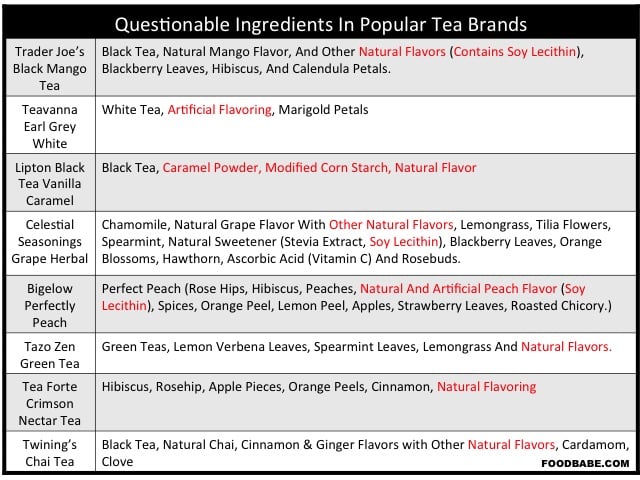
Many popular tea brands get away with using the ingredient “natural flavors” to trick the consumer into thinking they are buying better, cleaner ingredients; however companies are just covering up the inferior taste and low quality of their tea. Fortunately, there are brands that are putting the kibash on the use of natural flavors and using all real ingredients. I was happy to learn that Ahmed Rahim, CEO of Numi Tea is just as disgusted by this ingredient as I am. He said to me “You can breakdown anything that is found in nature and if it ends up tasting like the flavor you wish to use – you can add it to any product and call it NATURAL FLAVOR on the ingredient label. It could come from a stone in the ground and you’d never know.” This is why when I see the words “natural flavor” listed on a label – I put the product down and run far far away. I want to know what I am eating! Don’t you?
Additionally, the added risk of consuming possible GMOs is not something many people think about when consuming teas. Before this investigation and witnessing tea companies using modified corn starch and soy lecithin in tea (additives likely made from genetically engineered corn and soy), I didn’t think about it either! I can’t imagine having a serious soy allergy, considering all the places companies try to hide it.
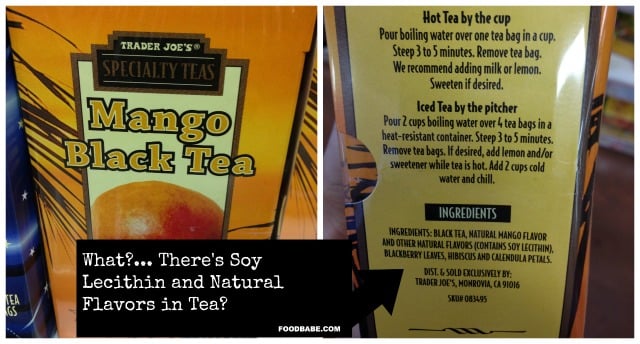
Why The Tea Bag & Packaging Matters
A recent article in The Atlantic discusses the “silky sachet” and “luxurious mesh bags” that hold loose leaf teas (like in brands Tea Forte and Mighty Leaf). Turns out, these modern day bags meant to showcase the tea leaves, are made of plastic.
PLA (polylactic acid) is a (likely GMO) corn-based tea bag material that has attracted major tea companies due to its nice look and its claims of biodegradability. Terms like “silky sachets” and “corn-based biodegradable tea bags” mislead customers into believing a product is more natural and sustainable than it really is. While the processing for PLA removes all traces of genetic material, it is still made with genetically modified corn. Although the actual tea bag is not an ingredient like teas and herbs, it is an element that is put into boiling water.
According to The Atlantic, tea bags are most commonly made from food grade nylon or polyethylene terephthalate (PET) which are two of what’s considered the safest plastics on the scale of harmful leaching potential. However, Dr. Mercola disagrees, he states:
“While these plastics are generally considered among the safest in terms of leaching potential, the molecules in these plastic tea bags may still in fact break down and leach out when steeped in boiling water…” Well, isn’t that how tea is prepared?
Another temperature consumers need to worry about in tea is the “glass transition” temperature. Here’s the science behind the glass transition temperature or, Tg, and why it becomes dangerous according to The Atlantic:
“That is the temperature at which the molecule in certain materials such as polymers begin to break down. As a rule, the Tg of a material is always lower than the melting point. In the case of PET and food grade nylon (either nylon 6 or nylon 6-6), all have a Tg lower than the temperature of boiling water. For example, while the melting point of PET is 482 degrees Fahrenheit, the Tg is about 169 degrees. Both nylons have a lower glass transition temperature than PET. (Remember that water boils at 212 degrees.) This means the molecules that make up these plastic tea bags begin to break down in hot water.”
So, while the plastic itself won’t melt in your tea, the glass transition temperature could potentially leak out harmful phthalates if there are such things in your tea. Another thing to worry about is that some of the newer tea bags are made with a variety of plastics. Some plastics are nylon, some are made of viscose rayon, and others are made of thermoplastic, PVC or polypropylene.
Beware of paper tea bags too, which can be worse than plastic tea bags.
GET THIS: Also according to Dr. Mercola, many “paper tea bags are treated with epichlorohydrin, a compound mainly used in the production of epoxy resins. Considered a potential carcinogen by the National Institute for Occupational Safety and Health2 (NIOSH), epichlorohydrin is also used as a pesticide. When epichlorohydrin comes in contact with water, it hydrolyzes to 3-MCPD, which has been shown to cause cancer in animals. It has also been implicated in infertility (it has a spermatoxic effect in male rats) and suppressed immune function.”
So what do you do the next time you want a cup of tea? Antioxidant rich teas aren’t going to do much to counterbalance the chemicals, additives and artificial flavorings in today’s modern teas.
First, I recommend looking at this chart below to see how your favorite tea brand stacks up:
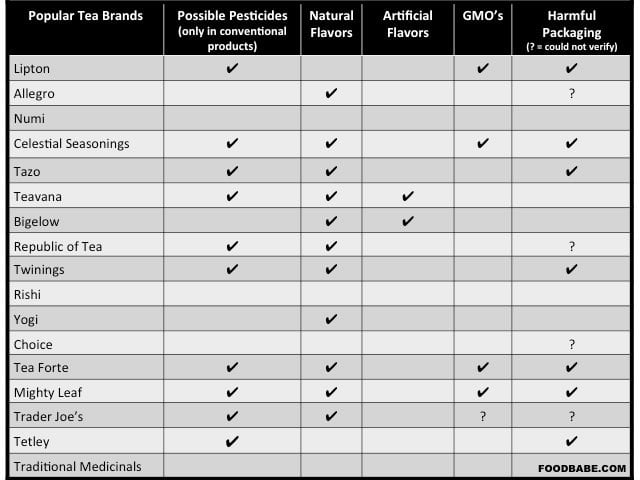
And then when brewing and picking out the safest tea remember these tips:
1. Choose an organic & non-GMO certified brand of tea. (My favorites are Numi, Traditional Medicinals, and Rishi Tea (loose leaf)).
2. Check the ingredient list on the back of the tea package to make sure there are no added flavors, GMO ingredients like soy lecithin and corn starch added to the tea leaves.
3. Make sure the brand you buy uses a safe form of packaging material or buy loose leaf tea and use a stainless steel or glass tea strainer. Have the company verify that bags do not contain epichlorophydrin, and avoid plastic tea bags all together. (Numi and Traditional Medicinals are some of the only brands I trust in this category because they have publicly stated they do not use this harmful ingredient or GMO packaging and are Non-GMO Project verified.)
4. The majority of restaurants use some of the most pesticide ridden tea and brands that have harmful packaging like Celestial Seasonings, Lipton, etc. Don’t fall victim to this. Bring your own tea when eating out or going to restaurants and ask for pot or cup of boiling water (remember to leave a good tip if you do this). I even do this at Starbucks because I like to vote with my dollars and not buy tea brands that are harmful. If you drink iced tea, brew your own at home and carry an insulated water bottle with you.
5. Remember these temps and times for brewing the perfect cup of tea
If you know someone who loves to drink tea, please share this post with them. I was just as shocked as you probably are about all of this craziness – knowing what’s in our tea and what we put in our body matters! Let’s change the world together.
Xo,
Vani


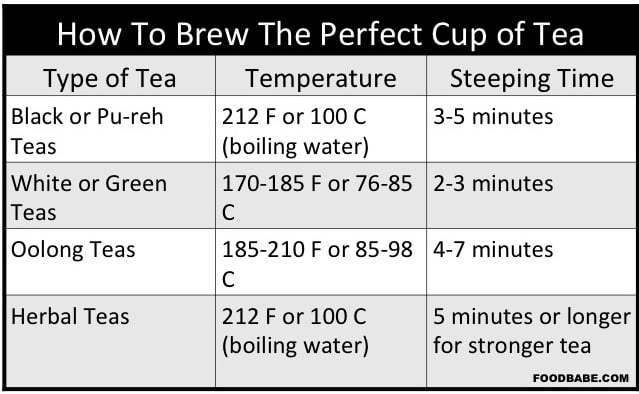






I recently bought Teavana youthberry & wild orange blossom tea (got caught up in the sensory journey), luckily I haven’t drank the tea yet. after reading this article, my tin of teavana tea has made it’s final journey to the bin.
Teavana is now owned by Starbucks and I took my gift back! Go somewhere else or try herbal teas!
Say it isn’t so!!!! Good to know.
What is a good tea to drink then? Which brand is recommended?
I trust http://www.artoftea.com as a source for high quality organic teas.
I looked at their site – they also include “natural flavors”! who are we to trust?!
Check out Pono Infusions, a company based in Hawaii that makes organic and free trade teas. http://ponoinfusions.com/
Check out this quality tea company
http://www.metoliustea.com/
They do not list the ingredients at all, which is absolutely bizarre (aren’t they obligated to do so?) Unless I’m missing something. How would you ever know what you were really drinking in such a case? That’s the whole point!
check this also out : http://www.harendong.com
Try the Traditional Medicinal teas. Lots of tasty trips to take with them.
Check out Humboldtherbals.com. Their tea is organic, made in small batches and sold in bulk. If you are used to bagged tea, try the loose tea and strain out the herbs. Another option is to use an unbleached muslin bag which is safe and reusable.
Dear Food Babe,
I have been a tea drinker for years and was very disappointed in your news about Celestial Seasons. So, goodbye to them and Lipton’s decaf and regular. I’m so grateful for your report. It’s appalling how the food industry uses chemicals that get passed on to us – without our knowledge.
I purchased Numi tea Breakfast Blend and it tastes wonderful.
Question: I also purchased Organic India’s Tulsi Peppermint Tea. I didn’t see it on your chart. Any info on this?
Thanks so much for alerting us to something I never would have suspected.
The food industry does not care who becomes ill or dies via toxic items—-it’s all about the almighty dollar !
Any info on STASH teas? They have been my go-to for a long time- just bought some today!
I’d like to know this as well.
I’d like to hear about STASH also. It says 100% natural on the back of the bag. But now is it really?
What if you remove the tea from the plastic sachets and put them in a metal tea ball infuser? If the tea is good other than the bag it comes in, seems like an easy solution 🙂 That way you don’t have to waste perfectly good tea, and you have more options available to you.
That sounds like it should be fine. And if it’s the plastic made from the corn, the article this one cites (from the atlantic) says that those ones are COMPLETELY safe to boil the teas in, as they do not contain the chemicals that are a danger from leaching and don’t leach until over the boiling point anyways.
…and hopefully it is GMO-free corn. Most corn grown in North America, however, contains GMO.
Are you insinuating that, although more testing should be done, the leading scientific consensus ISN’T that GMO produced produce isn’t perfectly safe for human consumption? You also seem to be under the assumption that all GMO food is exactly the same, as opposed to the (true) possibility that genetic modification can be used for different purposes, from making the plants more resiliant to bugs (this is the ONLY modification that could possibly harm people, and it’s not present in all GMO crops and even if it were, it still has not been shown to actually do so) simply increasing yields and making it grow faster. And then there’s cool GMO stuff like Biosteel, which is basically making spider-silk using genetically engineered goats (yes this is a real thing and it’s awesome)
On a side note however, I do completely support the idea of labeling laws, as people should be able to make their own choices despite all the fearmongering and the fact that GMO seems to have become a buzzword.
any idea about one tea that I love…PUka?How healthy actually this tea is to drink?
What about Twinings ORGANIC tea? Does that pass the test over their regular tea?
If anyone is interested in organic Chinese tea, Seven Cups of Tea in Tuscon, AZ has an amazing selection. You can buy their products online.
I just came from China (Hangzhou) where I bought first pick green tea and tea polyphenol concentrate tablets http://www.newteaera, which I noticed later have vitamin C and CORN STARCH. Yikes. I have written them an email, asking about whether the tea is organic and if the corn starch is GMO, and so far have gotten no response. Here’s the question: where might I get this tested?
China is a country that does not use or permit genetically modified foods, so you don’t have to worry about the cornstarch. This is a bit off-topic, but if you are looking for non-GMO tofu, soybeans, or soy products, Chinese grocery stores are the best place. Be sure to always read the ingredient label, but you’ll find most are non-GMO.
Here’s a link to an LA Times article about China’s rejection of a large shipment of corn that contained GMOs. I find it interesting that the US supplies China with GMO free corn, but here we have to really check to make sure that food products have non-GMO corn!
http://www.latimes.com/business/money/la-fi-mo-china-rejects-shipment-of-gmo-corn-20131227,0,2126813.story#axzz2rQaAsCFv
Hi foodbabe. I would like to inform you that your information on Teavana teas is not up to date and incorrect. Instead of copying and posting old reviews about Teavana, you should try to do some personal research.
First of all, Teavana did have pesticides in their tea, this was reported back in 2012. This issue was corrected early 2013 shortly after Starbucks took over… If it’s a banned import item, how is Teavana able to carry these teas now? The company never put the pesticides there in the first place, the tea suppliers and growers where they got their teas from did.
Second of all, you should probably recognise the difference between “Artificial Flavours” and “Artificial Ingredients”. After Starbucks took over, they gave advice to teavana saying that they didn’t need to list all the ingredients individually, which they used to do, on their tins to protect their recipes. Not one tea says artificial ingredients, does it? The “artificial flavours” that they talk about are exactly what they are… Artificial flavours, created by mixing one or more natural ingredients together to resemble another flavour. I.e. Their watermelon mint chiller has no watermelon in it, but they combined several other flavours together to resemble that fruit. Loads of organic companies do this too like mixing banana and strawberry to resemble a kiwi.
And third of all… What exactly is your expertise in tea? Any formal training or certificates with high end teas or is it just tea bags filled with tea fannings and dust that fall to the bottom of shipments for you?
I strongly suggest keeping yourself out of the tea industry.
Hi, Teavana shill. We can see right through you.
You are exactly right Rory.. I have friends who are huge tea blenders and I asked the same thing about the natural ingredients..no way are they giving up the actual recipe.. but I trust my friends who never sell something that wasnt of high quality
I am not a Teavana fan only due to the high overhead and high prices but they do make a quality product..Some of these so -called quality tea they are speaking of above is a bunch of bottom of the barrel bits they can buy inexpensively and throw in a tea bag..
Hi foodbabe. I would like to inform you that your information on Teavana teas is not up to date and incorrect. Instead of copying and posting old reviews about Teavana, you should try to do some personal research.
First of all, Teavana did have pesticides in their tea, this was reported back in 2012. This issue was corrected early 2013 shortly after Starbucks took over… If it’s a banned import item, how is Teavana able to carry these teas now? The company never put the pesticides there in the first place, the tea suppliers and growers where they got their teas from did.
Second of all, you should probably recognise the difference between “Artificial Flavours” and “Artificial Ingredients”. After Starbucks took over, they gave advice to teavana saying that they didn’t need to list all the ingredients individually, which they used to do, on their tins to protect their recipes. Not one tea says artificial ingredients, does it? The “artificial flavours” that they talk about are exactly what they are… Artificial flavours, created by mixing one or more natural ingredients together to resemble another flavour. I.e. Their watermelon mint chiller has no watermelon in it, but they combined several other flavours together to resemble that fruit. Loads of organic companies do this too like mixing banana and strawberry to resemble a kiwi.
And third of all… What exactly is your expertise in tea? Any formal training or certificates with high end teas or is it just tea bags filled with tea fannings and dust that fall to the bottom of shipments for you?
You are absolutely Right. I am also tired of people who post whatever they think they read somewhere and thinking they are experts in the subject. I do agree that all teas have some degree of contaminants. We live in a contaminated world. I do my best to drink clean tea. i feel Teavana has the greatest tea and great variety Their workers do a great job of informing customers what they need to know about their product. Don’t buy it if you don’t want to. Please stop posting things you are not sure about it
Rory: Where did you find the information that “Artificial flavours, [are] created by mixing one or more natural ingredients together to resemble another flavour. I.e. ”
This simply isnt the case with almost every ingredient listed as an “artificial flavor”. Check out Dr. Mercola’s site, particularly this article: http://articles.mercola.com/sites/articles/archive/2013/03/17/senomyx-flavor-enhancers.aspx
Also, since when do people with health blogs and websites need to be experts in everything they report? I don’t expect journalists to be experts in nuclear waste just to be able to report on it, and, as long as citations are present, you shouldn’t be targeting the messenger,in the same way that you wrote that we shouldn’t blame the tea distributor for the pesticides their farmers use.
I am pretty sure that Roy meant “natural flavors” in comparison to “artificial ingredients”. I would bet on it, as a natural flavor additive is when you take a natural food such as a fruit extract and combine it with a carrier, such as an alcohol. The essence of the fruit is then in a concentrate form within the carrier, which is then sprayed onto the tea, sealed for about 48 hours, to which the flavor of the fruit essence penetrates the porous tea leaves and the alcohol evaporates off, leaving the flavor of the fruit.
I just want to clear up a long standing myth about fannings and dust grades somehow being inferior to whole leaf tea. After drying, the last process in tea production is sorting whereby different particle sizes are typically sifted into uniform “grades”. The smallest particle sizes are used in tea bags because they brew much faster whereas whole leaf grades are more pleasing on the eye so are used in loose leaf applications. The chemical composition of both small and large leaf is no different so it is simply ignorant to suggest that small leaf and fannings grades are inferior.
I always wonder about staples (probably made from aluminum- known to cause breast cancer and alzheimer’s) used to hold the tea bags together. I always take it out and use the string to tie the tea bag back together. Have you also looked into this? I always get Traditional Medicinals tea which is rated highly for the packaging here- that is the one I am always removing the staples from.
It’s “Pu-erh”. Not sure I can trust your opinion when you can’t spell a variety of tea correctly and putting it in the same category as black tea is just wrong and brewing it like black tea is just as wrong.
Can you tell me what is meant exactly in the second to last table by “Toxic Pesticides (only in conventional products)”? What is considered “conventional products”?
Many thanks.
(I appologize if someone else asked the same question, I can’t go through 1,000+ replies!)
Any tea that is not organic.
(to Patty) I wrote to Organic India and got this reply:
Our tea bags have been made of paper, are GMO free. They have been tested, and no epichlorohydrin has been found.
With warm regards,
Dr U. K. Tiwari
Product Development Manager
Research and Development Division
Organic India Pvt. Ltd.
Kamta, Faizabad Road
P.O. Chinhat
Lucknow – 227 105
Phone: (Off.) +91 9956296685, 86
Mob:+91 9956296651
Fax:0522-2701395
E.mail:[email protected]
Skype id- uktiwari.oi
“Visit us at http://www.organicIndia.com
Another great source of Organic Teas is us.
http://www.herbsspicesteas.com
While we agree with most of this article, we don’t agree with how it refers to “Natural Flavors” as an issue. Natural flavors are usually a secret blend of essential oils, juices and extracts, which the company doesn’t want another company to easily copy or steal, so the term used is “Natural Flavor” instead. In our experience of tea. As a general rule, if the product says it’s certified organic and the ingredients state “Natural Flavor,” there’s generally not a concern. The Department of Agriculture requires common allergens to be listed.
Hello,
Do you know anything about Good Earth teas? They are my favorite…
I drink Japanese green tea
Just drink dandelion root tea, its amazing…great for your liver, colon, kidneys and it tastes great…
For those of you looking for another alternative, Tulsi tea is organic and non GMO – I love their peppermint and lemon ginger. http://blog.organicindiausa.com/earth-dais/our-natural-flavors-are-truly-nectarous-herbal-extracts/
And for those of you who are into coconut tea, you MUST try Rishi brand. It’s amazing!
Vani, I know you’ve mentioned before where you bought the nifty organizer for the tea drawer, but I can’t find that post. Could you please share? Thanks.
Any idea on how St. Dalfour organic teas stack up? I love the strawberry flavor especially. Under ingredients it says “Organic ceylon tea with the all natural flavor of strawberry.” Does that mean “natural flavors” or “strawberry?” Thoughts?
My husband drinks gallons of tea in a week. He currently uses Lipton and I want to switch him to a better choice. I am not a tea drinker so I am having trouble picking the best choice for him. He drinks just the regular tea no special flavor so I need a recommendation for a substitute. Thanks.
I’d also like to know the answer to this question!!!
Really any black tea should work. I would look for Breakfast teas because they are usually a simple black tea. I drink Yorkshire Gold usually and sometimes Twinnings black mint tea. The ingredients for Yorkshire Gold (from UK) are simply “black tea leaves”. I think that if you look at the ingredients and literally all that is listed is “black tea” or “black tea leaves”, you will have a suitable substitute for Lipton!
I like to brew a big batch or two and then put it into a pitcher in the fridge for my iced tea. My mom had a fancy tea maker, but I find just straight brewing in a kettle works equivalently as well.
After reading this article, I went to look at all my teas, and honestly basically all of them (even included brands on her table like Yogi) had just 1 ingredient listed: tea. I just don’t like Lipton myself (and I grew up in the South!), so I’m happy to give you alternative ideas 😀
I don’t know if you can get Dilmah tea where you are from, but it’s fabulous! Single origin Sri Lankan tea, it’s absolutely wonderful. They have a straight black tea that’s lovely. In my country we can get it at Co-op, but I don’t know where else to get it.
I contacted Celestial Tea & Bigelow Tea. They both refute the information in this article.
Could you please share what, exactly, they said?
Link to Celestial Seasoning’s response: http://www.celestialseasonings.com/product-safety-facts
Bigelow Tea – Sallie,
Thank you for once again reaching out to us. All of our teas and ingredients are tested each year. We have volumes and volumes of data related to all of our testing. Unfortunately, in regard to the blog you are referencing, we have not seen any test results pertaining to our teas that are referenced in the blog. Therefore, it is difficult for us to understand what tests and by which independent lab that we are addressing.
Kathy
I contacted Celestial Seasoning to and received the same information. I’ve called and emailed asking for the report from the National Food Lab showing their tea is pesticide free but they can’t (won’t) release it. I would think if their product was safe they would want to spread that like wild fire on all social media sites to refute the contradicting information. Why won’t they release the results? That’s my hang up.
I want to know the facts too. I posted this on both of their facebook pages. Let’s see if we get anything else.
I sent Yogi an email asking them about this (since I drink a bunch of their tea). here’s their response: “Here at Yogi, we are committed to sourcing the highest quality herbs and botanicals from around the globe. Please be assured that all the ingredients we use in our teas are monitored by the FDA and USDA for pesticides. In addition, we follow the USDA’s National Organic Program (NOP) for all of our ingredients and teas, and our facility is Organically Certified by Quality Assurance International (QAI), an independent third party organic certifier. QAI audits all of the ingredients used in our teas to ensure that they adhere to the NOP’s strict guidelines and regulations.”
“… monitored by the FDA and USDA …”
Somehow I don’t find that very reassuring.
I like Tazo Wild Sweet Orange – any comments on it ?
One popular ‘natural flavour’ is beaver anal glands that have been dried and powdered.
Tastes a lot like vanilla and is frequently used in place of it. Been around a long time thanks to the fur industry apparently.
I’ve learned this recently about the vanilla and raspberry “natural flavorings”. It is so disgusting to me, I can’t bring myself to drink or eat any more raspberry or vanilla flavored things. Yuck!
Any info about Salada?
OMG!!! I am not happy about this at all – I am a nightime tea drinker – 10PM on the dot.
SAD SAD
Hi Foodbabe,
Thank you so much for this enlightening article! I Have been trying to “quit” diet coke by replacing with the (supposedly) healthier alternative- tea.
I have been drinking Harrod’s english breakfast blend and it doesn’t appear to contain natural flavors or any other dicey ingredients, but I do not know about the a) paper satchets or the pesticides. any information would be great!
Thank you!
Hannah
I recommend the Yorkshire brand form the Uk, has been available in Canada for several years. Excellent quality control.
While the existence of pesticides is potentially worrying, the issue of GMOs is not, at least from a rational, scientific standpoint. Of the 600 or so studies on the safety of GMOs, not one shows any ill effects of any currently marketed GMO food product.
Those “600 or so studies” were done by Monsanto and other companies that profit from GMOs. Google “GMO test results” and see how many studies show they are unsafe for all organisms. The ultimate tests are when GMO and non-GMO foods are made available to wild animals. The animals will eat the non-GMO and leave the GMO foods.
That is simply not true. The 600 studies are from multiple countries, universities, independent institutions, government food safety boards, etc. Yes there are lots from Monsanto et al but please don’t tell me I have to explain the peer review process to you. And no, animals can not tell the difference between so called “organic” and GMO foods. You’d been fooled by internet memes my friend. You either believe in science or you’re wrong.
Btw, I googled “GMO test results” as your suggested and couldn’t find a single peer reviewed study showing negative health effects from any currently marketed GMO food product. I didn’t really have to do that mind you, I’ve been researching this topic for years.
You do have a point about the animals, their obviously superior intellect must have warned them that GMO’s are evil & are the beginnings of a genetically modified human race that eventually take over the world in the next century. Kind of like how my dog eats his own poop, he must know something that we can’t be taught with empirical, fact based data.
I wanted to emphasize that organic farmers are allowed to use pesticides, and these pesticides may sometimes be even more harmful than the pesticides mainstream farmers use.
Very true, Robert. It’s been a know fact for a long time that about 50% of synthetic pesticides are considered carcinogenic. We’ve only recently begun testing so called “organic” pesticides and guess what? About 50% of those have turned out to be carcinogenic as well. Organic pesticides escaped the scrutiny of proper testing for years due to the fact that they were assumed safe because of their natural origins. This is what is known as a naturalistic fallacy. We still have limited data in terms of the effects of organic pesticides on health and the environment.
What about Arbonne herbal detox tea? No chemicals, no “natural” unidentified ingredients and I love it. If you want to try it, send me an email through my website and I”ll give you 20% off JaniceKaye.myarbonne.com
Perhaps i’m being naive, but why should pesticides even be used on tea(s)? Since black tea is camelia bush leaves, i’ve Never seen ANY insect damage on my camelias. Since growers know the leaves (of whatever) will be ingested as food, seems counterproductive to poison them. I’m thinking this is an alarmist article.
I am interested in the tea dividers you used! Any insights there 🙂
This is why all my tea comes from http://www.republicoftea.com/
So obscure that studies like this one don’t check it. No scare for me.
Republic of Tea is listed on the chart as having Toxic Pesticides and “Natural” flavours.
I was really, really hoping it wouldn’t be, because I must have 50 different RoT varieties in my tea cupboard. But, alas, there it is.
Check out little Light of Day Organics in Traverse City Michigan…the only certified organic and Biodynamic grower of tea leaves in North America! If you go to YouTube and type inn the search bar: Destination Michigan #502 , you can watch a piece that PBS did on this sweet farm. They also have a website- it’s LightOfDayOrganics.com and they passed along a coupon with my last order: humility- for $3 off each order. Their tea is as pure as can be- all certified organic- that;s all they sell– and the owners and staff are all good-hearted folks. The Creamy Earl Grey is heavenly and the Sun in the Winter is just like the name- nice mood lifter! The Mitten time mint is another one of my favorites this time of year.
Do you know anything about international brands? I’m Indian and I drink alot of chai. Usually get Lipton yellow label, tetley, lasa lamsa, and pg tips. How can I find out about these?
I looked up the EPA allowed levels and compared them with the eurofins test results in the Glaucus report for one of the teas they allege exceeded EPA limits and guess what? It did NOT exceed EPA allowed levels. This calls into question the premise of your article. I think Hain and Celestial Seasonings have been given a bad rap. Perhaps you should try to fact-check things before you use them as a basis for a sensational article, even though Glaucus didn’t make it easy to do (a lot of looking up chemical pesticides in the 40CFR180 EPA pesticide regulations).
Thanks for looking into teas with such care and consciousness. I put a link to this blog in a blog I wrote about opening up your intuition by drinking tea. Many people are very sensitive and I was happy to be able to bring some awareness to those who are thru your work. Thank you! Here is the link: http://www.youknow.net/cnt/open-intuition-tea/
and this is why we only buy are tea at http://www.TheSippingCottage.com !
I must recommend http://www.mountainroseherbs.com for teas, spices, mad herbs of all kinds. Their quality is top notch.
I used to LOVE Celestial Seasonings when I first found them in the 1980’s. They were sold to a larger company and the quality suffered. I went on the free tour of the factory when I was in CO on vacation. It was a very cool experience.
I have an acquaintance who is extremely sensitive to MSG. MSG has many different names, one of which is “natural flavors”. There’s no way to know if the natural flavors used contains free glutamic acid and how it will react in your body. There’s basically no fruity tea you can buy that does’t have natural flavors unless it comes from only fruit and flower parts. Alvita is an herbal tea company which only sells pure plant parts.
Hi Food Babe!
I was wondering if you’ve ever looked into/tried “Two Leaves Tea Company” tea? They state that their teas are organic and non-gmo certified. The “sachets” that they put the tea in are also quite interesting (and un-like any other tea “bag” I’ve ever used) – their website states that the tea “sachets” are made from corn-based nylon as opposed to petroleum-based nylon. I would love to know if you’ve had any experience with this company? I LOVE their “Better Belly” tea and am an avid shopper of these teas. Any information you might have would be greatly appreciated!
Warmest Wishes,
Candace
I heard about this product a year ago but I have been using 6 months now. CC Tea helps me in refreshing my mind and I drink often after taking classes. Keep up the good work Sui Generisians.
Organic farmers also use pesticides.
Heavy metals and pesticides are well known, documented health hazards backed up by medical literature. GMOs have not had any illness or hazard reported in any Credible medical journal. Please stop perpetuating a myth that they are dangerous to health and focus on the factual ie. heavy metals and pesticides and carcinogens–PROVEN dangers found in non-organic and organic teas alike.
I know you mentioned Bigelow, However… I’m currently drinking the certified organic green tea version. I’m thinking this one might be ok? Any word on this one?
As I am probably a lot longer in the tooth than many of you here goes……..My family has been in the food business for a very long time. We promote small batch makers of as many products as possible. Organic sounds nice, to me clean sounds better, all natural is ok too. Ask yourself why many of our European and Asian cousins reject American beef, corn and many other food items. do they know something we don’t want to bother finding out?
If you were to really look into tea brands in the US the only thing unique about many, not all, of the smaller “boutique” brands is the packaging! The tea is sourced from a single large blending company and the rest is pure hype. Most of the entrepreneurs who made up the names never set foot on a tea plantation.
I drink tea, mostly loose blends, preferably from Irish or Brit blenders. The US company I would favor most is John Harneys, family owned so far and they go to the source.
As far as any government agency assuring your safety, forget it. Understaffed, under qualified and under paid, we get what we pay for, think Congress.
Amen
I started using CC Tea long ago and I drink thrice a day which has given me best results in improving my health and cautioning from diseases. I’m also happy that I could work and finish my daily routine in time without any tiredness. Wishing Sui Generis a prosperous journey.
Try humboldtherbals.com. They sell organic tea in bulk and make all their blends in small batches so it is fresh! If you are not used to making loose tea, give it a try and strain out the herbs. Another option is to use an unbleached muslin bag which can be reused numerous times.